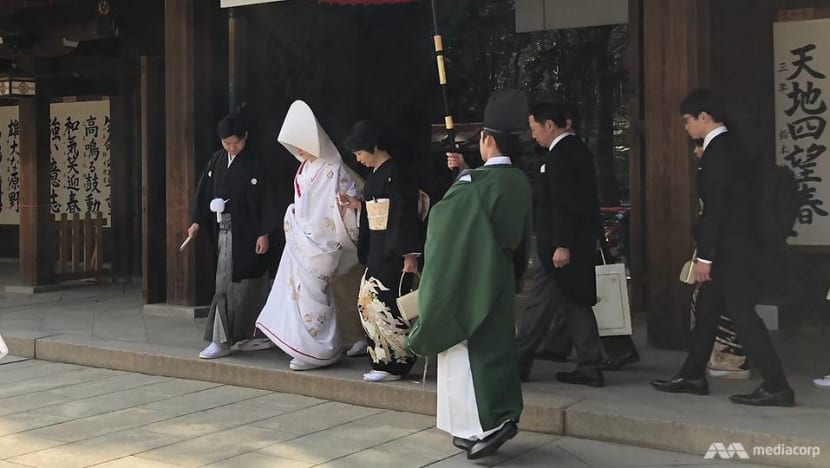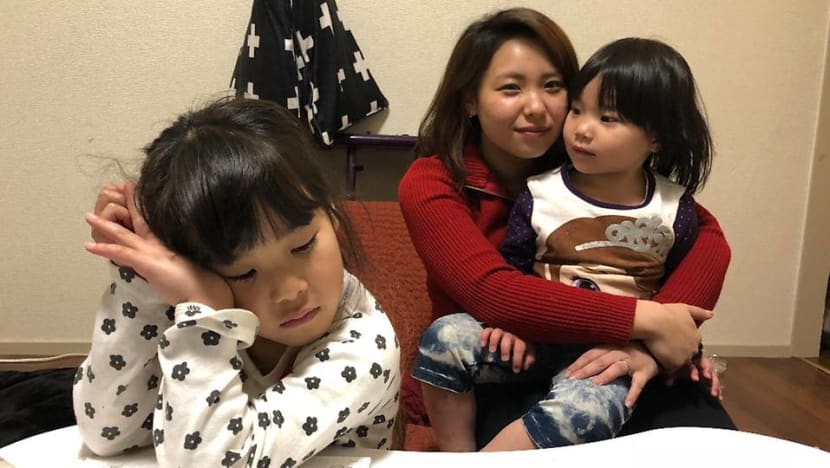The marriage challenge: Can the trend of declining wedding rates in East Asia be reversed?

A traditional Shinto wedding at Meiji Shrine. The sight is becoming rare as marriage rate continues to decline in Japan. (Photo: Wei Du)
HONG KONG: Declining marriage rates are being seen around the world, but it is perhaps in the ageing societies of Asia that the growing number of singletons is worrying parents - and governments - the most.
In China, parents have taken to handing out flyers in matchmaking parks, often without the younger generation’s knowledge; in Japan, blind dating cafes try to set up busy professionals over some coffee and cake, and if they find no chemistry, there’s always going back to slogging away in the office.
In South Korea, a preference for baby boys has resulted in a massive gender imbalance and men who can’t find a wife at home, so they’ve turned to marriage migrants: Foreign women are now getting married to Korean men to escape poverty. In Hong Kong, men finding partners in mainland China has led to a surplus of women in the city and a dating agency charges local women US$600 for a blind dating dinner which foreign men could attend for free.
Yet nothing seems to help. Marriage rates continue to slump across East Asia. It’s a pressing issue because in Confucian societies, no marriage often means no children, which could threaten a country's economic prospects and, arguably, its survival.
MARRIAGELESS IN JAPAN
While parallels of fewer marriages and plunging birth rates can be found in all East Asian societies, the broad trends almost always started in Japan.
According to Japan’s National Institute of Population and Social Security Research, by the time they turn 50, one in four Japanese men remains single, as does one in seven women.
But that is not for the lack of trying. Studies also suggest that many Japanese singletons still want to get married.
So Arata Funabara, four times married himself, opened a speed dating cafe in Ginza to help. Office workers can drop in for an hour or two in the middle of the day to chat up the opposite sex.
In true Japanese fashion, most come in pairs or trios. Funabara offers them a choice of 3 coloured wristbands. Most choose “not looking” blue, though the cafe owner says that doesn’t mean they are really uninterested.
“Japanese people, we are very shy.”
But anthropologist Yoshie Moriki says it hasn’t always been the case. She remembers in the 80s and 90s when Japan experienced rapid economic growth, men were a lot more enthusiastic about courting women. However, two decades of economic stagnation changed the game for young men.
“These young men in their 20s and 30s now are making much less money than the previous generation. But still the women are looking for similar level of economic capability,” she said.
“At the same time, young men themselves still think it’s their responsibility to provide, so I think the economic structure is simply not possible.”

To be sure, Moriki’s not blaming women for seeking financial security in a marriage. In mainland China and Hong Kong too, women often want to “marry up”, a task made harder now that they are better educated and better paid themselves. But in Japan, marriage, or just the perception of wanting to get married, could take a toll on a woman’s career.
“There’s a female penalty in a lot of companies,” says Prof Jeff Kingston, Director of Asian Studies at Temple University. “Companies assume women are going to get married and have children, so they put them on the so-called mommy track, in less responsible positions.”
Even if a woman can skirt that trap early in her career, getting married and having children still often requires her to take a career break.
“Gender division of roles is still very strong. Raising children and taking care of the family is seen as a woman’s work,” says Kingston. “If they sacrifice either child care or elderly care for their careers, they are accused of being selfish.”
Once out of the workforce, most women find it impossible to return to a fulltime job. That means the short career break would end up costing a Japanese woman US$2 million in lifetime earnings.
“Naturally when women think about marriage, they are very cautious in Japan,” says Zhou Yanfei, a Senior Researcher at the Japan Institute for Labour Policy and Training. “They have to set an income level for their partners.”
THE CHILDREN ARE ALRIGHT
When Asians don’t marry, they tend not to have children.
In Britain, close to 50 per cent of new babies are now born out of wedlock. The figure is just 2.3 per cent in Japan, 1.9 per cent in Korea.
For all the efforts made towards halting the population decline, few Asian governments, including Japan’s, make it easy for men and women to have children on their own.
“Politicians are reluctant to go there because their idea of the Japanese identity is tied to the traditional family” which consists of a father, a mother and two children, said Kingston.
“By 2040, they estimate 40 per cent of Japanese households will be single people, so the traditional family has already departed, but government policies are still assuming that it’s a strong pillar of society.”

For the few women who choose to become single moms, hardship awaits.
According to Zhou of Japan Institute for Labour Policy and Training, 51 per cent of single mothers in Japan live in poverty, and one in seven says she cannot afford basic necessities like food at least from time to time.
Masami Onishi, 24, works nine hours a day, six days a week to make US$800 a month. Having a full-time job is also a prerequisite for her to receive some government welfare.
Though never married, she wears a wedding ring.
“When I didn’t wear the ring, strangers would come up and tell my girls that they had no father. It hurt them badly,” she said.
The policy of requiring single mothers to work befuddles experts.
“The rate of poverty doesn’t change very much even when the mothers are working, because of the weak position women occupy in the labour market,” said Zhou. “The government needs to boost welfare spending on these families now, because poor mothers raise children who go on to be poor.”
The inter-generational transfer of poverty is not news to Yasuko Kawabe who runs a food bank for single mothers and their children. But she feels politicians are deliberately looking the other way.
“If we help these children now, they’ll grow up to be taxpayers for the country,” she says. “Just think about how wonderful that would be.”
WE ARE NOT SPECIAL
An added problem for Korea and China in nudging their people to marry is a preference for baby boys, which has led to skewed gender ratios, and now statistically a portion of their men will never find a wife at home.
Enter Vietnam, a country that shares their Confucian culture. Starting in the 90s, commercial marriage brokers took Korean men there to look for a spouse.
For Korea though, it was an affront to the country’s identity.
“We have long been thinking that Korea is a uni-race, pure blooded country,” said Prof Choi Hyup, a research professor in anthropology at Chonnam University.
In the hastily arranged unions, the mismatch of expectations sometimes led to tragedies.
“The women came here because they wanted to help their families in Vietnam. The men are often very old or disabled. They paid for the women to be here to help their families,” said Yoo Si Hwang who counsels Vietnamese migrants in a Seoul church.
After a slew of high profile abuses and a few murders of Vietnamese brides in the 90s and early 2000s, the Korean government tightened rules for cross-border marriages, setting a minimum income requirement for the men. It also opened multicultural family centers around the country to help the foreign spouses integrate.
Pham Minh Chinh is one of the thousands of young Vietnamese girls who married Korean men more than 10 years their senior. She’s now fluent in Korean, adapted well to the life of a strawberry farmer and raised two children with her husband in Korea’s rural Chonnam province.
Children of mix-race marriage though tend to struggle in school. Because their mothers often speak limited Korean, they develop language skills later than their peers.
The idea that being pure-blooded Korean is superior still lingers, and often means they become targets of bullies.
“We need to teach our children that we are not special,” says Choi. “That the Korean culture is not special, it’s just one of the many cultures in the world. Because what choice do we have?”














